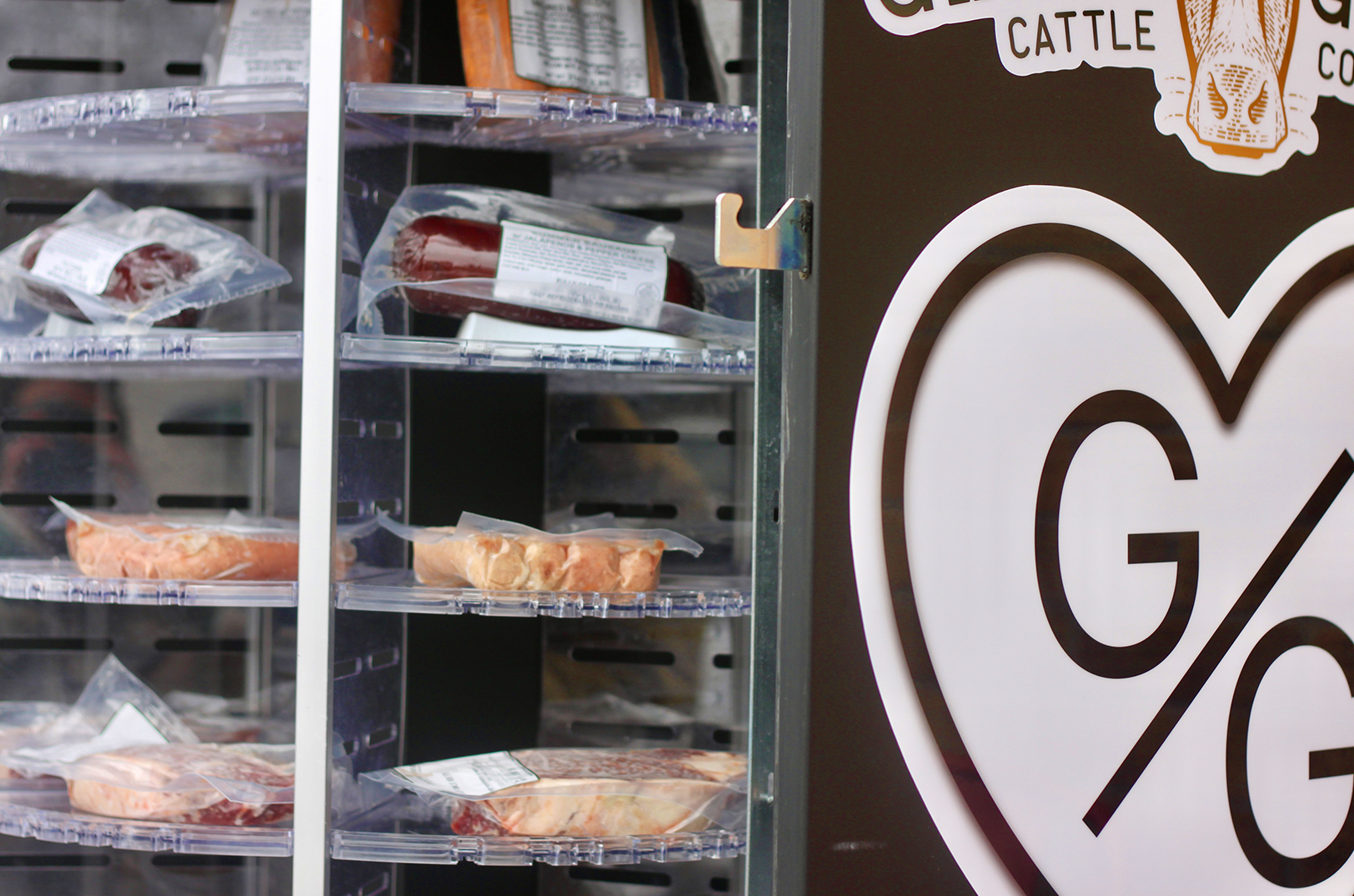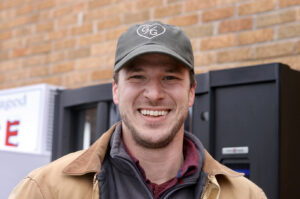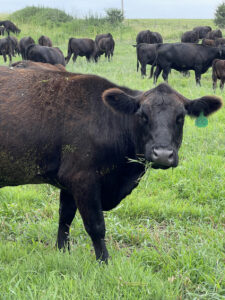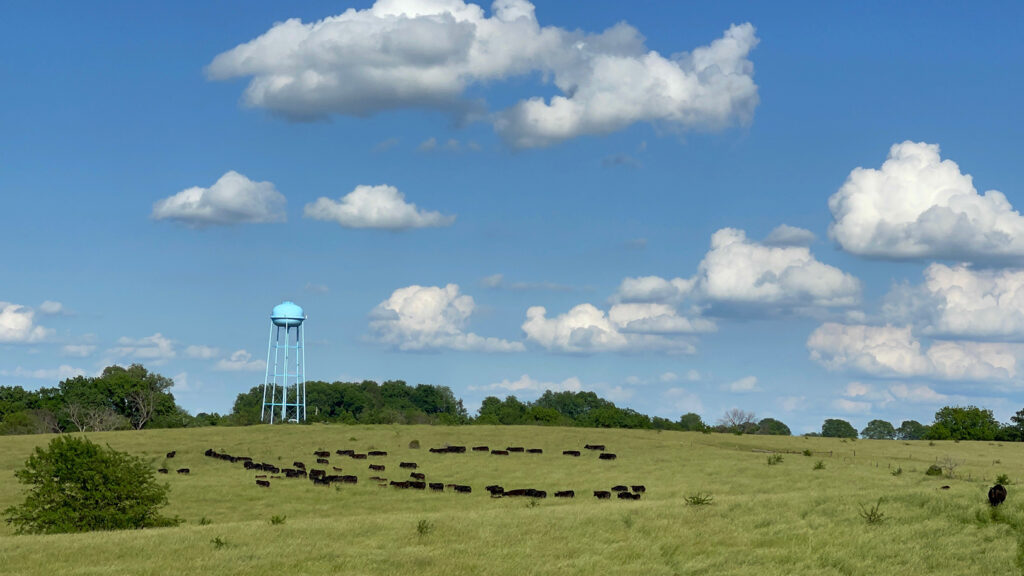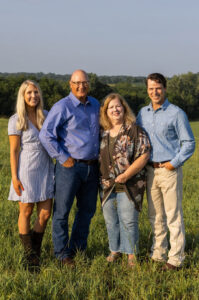If a farm-to-table beef vending machine is going to successfully plug into a hungry market, Tim Haer has just the place to meet the challenge, he said.
“Kansas City — at one point in time — had the largest stockyard in the nation and we were known as Cowtown USA,” noted the startup worker-turned-Green Grass Cattle Company herdsman. “So if this is going to succeed — and doesn’t succeed here — that would be a surprise.”
Green Grass Cattle Company — a family-owned provider of premium, humanely-raised Black Angus beef in Weston, Missouri — recently launched Kansas City’s first farm-to-table vending machine, located outside Front Range Coffeehouse and Provisions in Waldo at 400 E. Gregory Blvd.
In its first week of operations, Haer said, he already had to restock the vending machine three times. If it gets people talking, he sees the venture as a victory.
“Whether or not the vending machine is successful long-term, the goal behind it is to generate awareness and prompt critical thinking about where our food comes from,” he explained. “We want to have a sustainable and profitable business, but it became a goal of mine to actually close that gap — make more of a connection with where our food comes from — and challenge people to think critically about that. … It wasn’t that long ago that everybody had gardens and everybody had some connection to agriculture, and we’ve just gotten so far away from that.”
Green Grass — whose motto is “raised, not sourced” — also sells its products in its Mercantile Store in Weston and online.
Click here to shop for Green Grass Cattle Company beef.
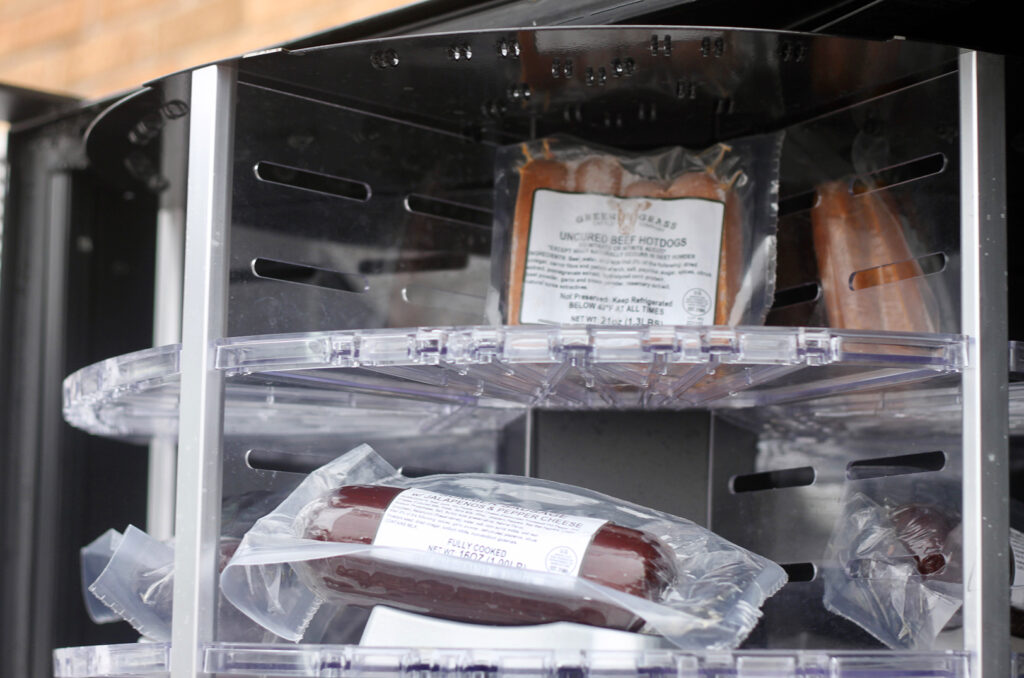
Beef vending machine from Green Grass Cattle Company outside Front Range Coffeehouse and Provisions in Waldo
Haer — a sixth-generation cattle producer and farmer (and former business development manager at Overland Park-based Daupler) — first had the idea about six months ago when he read a magazine article about the popularity of vending machines across the globe for uses other than snacks and drinks. So he said he started looking into it domestically.
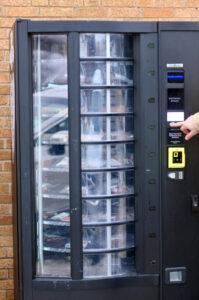
Beef vending machine from Green Grass Cattle Company outside Front Range Coffeehouse and Provisions
“There’s a handful of meat vending machines across the United States,” he continued. “There wasn’t any in Kansas City. And what I’m finding out — and I haven’t confirmed this yet — there’s a reporter from St. Louis that called and he believes that it might be the first-and-only true farm-to-table vending machine in the United States. Because the other vending machines that are doing what I’m doing, they’re meat and poultry shops. They’re not actually raising the cattle, so it’s kind of unique in that regard.”
Haer plans to stock the vending machine according to consumer demand, he said. To start, he’s filled it with the family’s all-beef hotdogs, bacon cheeseburger bratwursts, jalapeno cheddar summer sausage, boneless ribeyes, KC strips, center-cut sirloin medallions and strips, and tenderloin filets.
“The first product to sell out was the summer sausage, followed by the bratwurst,” he added. “Less than 36 hours later, they were gone.”
The cuts of beef are frozen when they are stocked in the refrigerated vending machine, he noted, and switched out every three days. The vending machine stores them at 34 degrees and will not allow a customer to buy anything if the machine has malfunctioned and the temperature rises to above 38 degrees.
Click here to follow Green Grass Cattle Company on Instagram.
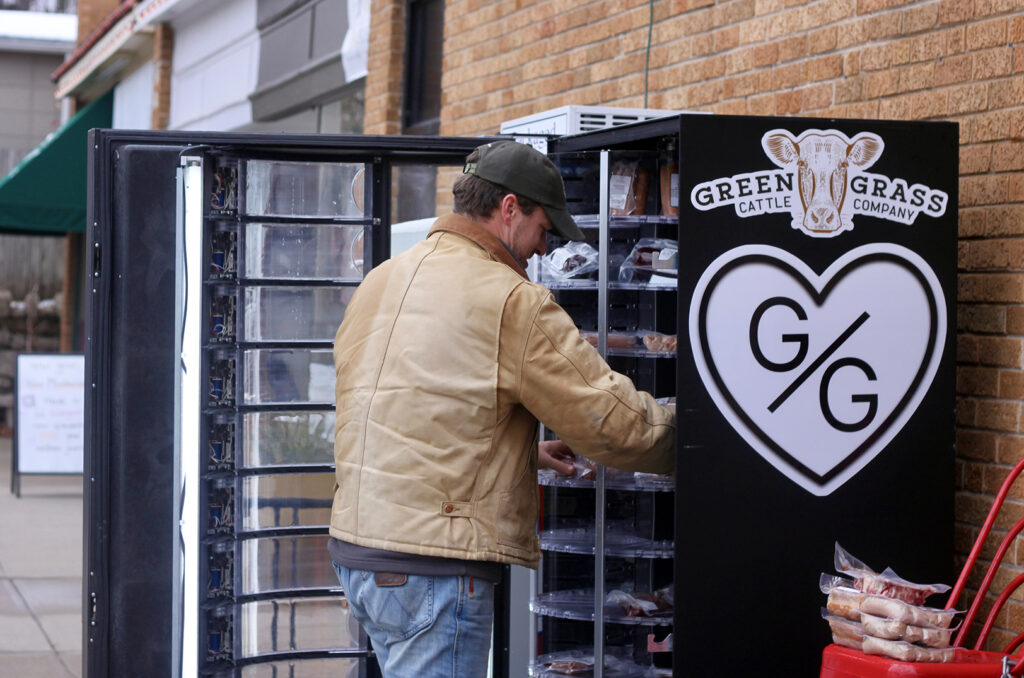
Tim Haer stocks a beef vending machine from Green Grass Cattle Company outside Front Range Coffeehouse and Provisions
Haer includes his name and number on the front of the vending machine, he said, encouraging people to contact him if they have any questions, especially about how the cattle are raised.
“My first focus is taking care of the cattle, and it’s part of our message to the customers,” he shared. “We don’t do things the easy way. … I love cows. So it wouldn’t bother me one bit if somebody called me and said, ‘Hey, what’s the feed ration? Are they grass-fed? Or are they grain-fed?’ I love answering these questions and I love — not necessarily educating people — but just sharing more information about what I know.”
The vending machine found a home at the Western-and-mountain themed Front Range Coffeehouse and Provisions, Haer explained, through Green Grass’ partnership with Sandlot Goods — one of Startland News’ Kansas City Startups to Watch in 2023 and the maker of the farm’s hats and merchandise. Made in KC — which shares owners with Front Range — also has an ownership stake in Sandlot.
“We are excited to partner with Tim and Green Grass Cattle Co and bring this unique offering outside of our neighborhood cafe and bar,” said Keith Bradley, co-owner of Made in KC, in a news release. “What Tim offers ties in well to our concept at Front Range, where we aim to serve more than your daily cup of coffee and provide you an experience worth sharing with your friends and neighbors about.”
View this post on Instagram
Family roots
The Haer family has always raised cattle and farmed corn and soybeans — first in Craig, Missouri, and now in Weston. Until two years ago, it was always a side hustle. Tim’s dad, Gary, decided to retire from the biodiesel industry and farm full time, asking Tim — who then was working for govtech firm (and another Kansas City Startup to Watch) Daupler — to join him. Tim’s mom, Mary, and sister, Megan, also work on the farm and run its Mercantile Store.
“I don’t think I could ever go back,” Haer said about leaving the tech world. “Even on really, really cruddy days — like today — when I woke up and I looked outside and there was snow on the ground. And I was thinking, ‘Oh my gosh, today’s gonna be a really rough day feeding cattle.’ I would rather have 100 days like that than be in the office for eight hours. There’s something about farming. It’s just good for the soul.”
It was also about two years ago, Haer recalled, that the family decided to focus locally and sell their beef directly to the consumer instead of as a commodity. It started when they took 30 of their cows in to be processed and had them graded. Eighteen were graded as prime, which is the highest grade.
“Only 4 percent of Angus cattle receive that grade,” he said. “So we knew we had something special in our genetics and how we were feeding them and how we’re raising them.”
Once his dad realized what grocery stores were charging versus what he was receiving in commodity pricing, he noted, they decided to make the leap. They started with their Mercantile Store and online, and have now added the vending machine.
“I want other farmers, other ranchers to have a look at this and, hopefully, it inspires them to think differently about how they can market their products and apply some innovation in an industry that is older than the United States itself,” Haer said. “If the ag industry is going to be not just corporate conglomerates — if they’re still going to be family farms 50 years from now — I think we have to start looking at some of that stuff.”




